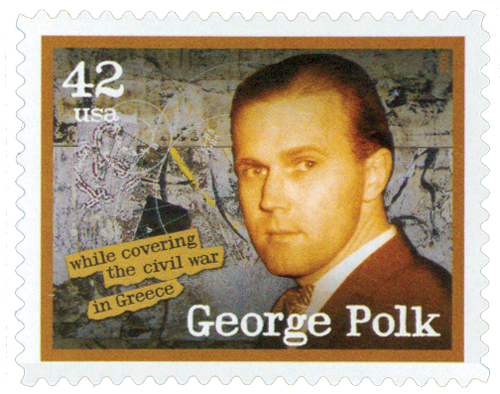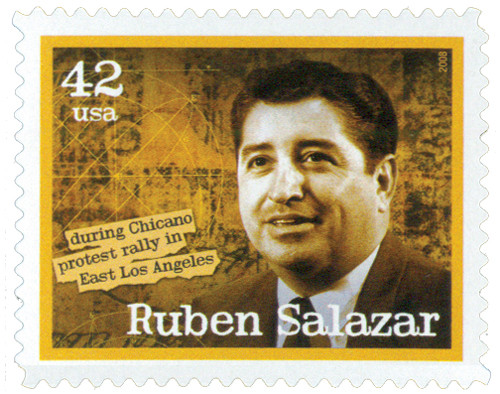
# 4250 - 2008 42c American Journalist: George Polk
George Polk
American Journalist
Issue Date: April 22, 2008
City: Washington, DC
Birth Of George Polk

Journalist George Polk was born on October 17, 1913, in Fort Worth, Texas. He was a descendent of US Presidents James K. Polk and Andrew Jackson.
Polk attended the Virginia Military Institute but left during his junior year. After returning briefly to Fort Worth, he grew restless. Polk spent some time in California before going to Alaska, where he attended the University of Alaska.
After graduating with an English degree in 1938, Polk worked as a reporter in China and France. After the US entered World War II, he joined the Naval Construction Battalion (Seabees). During the war, he volunteered as a dive-bomber and reconnaissance pilot. In a battle near the Solomon Islands, Polk was searching for a downed pilot when two Japanese fighters attacked his own plane. He got away from them but had to land his plane in the ocean and spent a week with friendly villagers before an American plane passed over to help him. Polk also contracted malaria and was in the hospital for nearly a year.

After the war, Polk was one of the elite reporters recruited by Edward R. Murrow for CBS radio. By 1948, he was in Greece reporting on the civil war there. As an outspoken critic of the Greek conflict, Polk exposed corruption in the US-backed Greek government, finding evidence that they had stolen US aid. The Greek government requested that CBS reassign him, but CBS refused. Colleague William L. Shirer remarked, “George was more passionately involved in his work than most… I wondered if he realized whom he was playing against.”
Polk stood by his convictions, putting the story before his personal safety. He was founded dead on May 16, floating near the port of Thessaloniki, with his hands and feet bound and a bullet wound to his head. Three Greek communists were convicted of his murder; the Greek government claimed Polk was killed while trying to get a meeting with a leader of the group. Most historians believe the real story was never revealed. Polk’s younger brother William thought, “The trial was a joke. The defense attorneys never raised any of the issues they could have raised. They never called witnesses they could have called. It was like a Soviet show trial.”

During his short life, Polk also reported for the Fairbanks Daily News, the Shanghai Evening News, and the Herald Tribune in Paris and New York. He wasn’t the first or the last reporter killed maintaining his journalistic integrity, but he set an example for others to follow. Since 1949, the prestigious George Polk Awards have honored journalists who have reported on issues vital to the American public.
George Polk
American Journalist
Issue Date: April 22, 2008
City: Washington, DC
Birth Of George Polk

Journalist George Polk was born on October 17, 1913, in Fort Worth, Texas. He was a descendent of US Presidents James K. Polk and Andrew Jackson.
Polk attended the Virginia Military Institute but left during his junior year. After returning briefly to Fort Worth, he grew restless. Polk spent some time in California before going to Alaska, where he attended the University of Alaska.
After graduating with an English degree in 1938, Polk worked as a reporter in China and France. After the US entered World War II, he joined the Naval Construction Battalion (Seabees). During the war, he volunteered as a dive-bomber and reconnaissance pilot. In a battle near the Solomon Islands, Polk was searching for a downed pilot when two Japanese fighters attacked his own plane. He got away from them but had to land his plane in the ocean and spent a week with friendly villagers before an American plane passed over to help him. Polk also contracted malaria and was in the hospital for nearly a year.

After the war, Polk was one of the elite reporters recruited by Edward R. Murrow for CBS radio. By 1948, he was in Greece reporting on the civil war there. As an outspoken critic of the Greek conflict, Polk exposed corruption in the US-backed Greek government, finding evidence that they had stolen US aid. The Greek government requested that CBS reassign him, but CBS refused. Colleague William L. Shirer remarked, “George was more passionately involved in his work than most… I wondered if he realized whom he was playing against.”
Polk stood by his convictions, putting the story before his personal safety. He was founded dead on May 16, floating near the port of Thessaloniki, with his hands and feet bound and a bullet wound to his head. Three Greek communists were convicted of his murder; the Greek government claimed Polk was killed while trying to get a meeting with a leader of the group. Most historians believe the real story was never revealed. Polk’s younger brother William thought, “The trial was a joke. The defense attorneys never raised any of the issues they could have raised. They never called witnesses they could have called. It was like a Soviet show trial.”

During his short life, Polk also reported for the Fairbanks Daily News, the Shanghai Evening News, and the Herald Tribune in Paris and New York. He wasn’t the first or the last reporter killed maintaining his journalistic integrity, but he set an example for others to follow. Since 1949, the prestigious George Polk Awards have honored journalists who have reported on issues vital to the American public.











